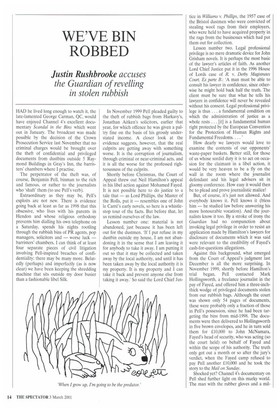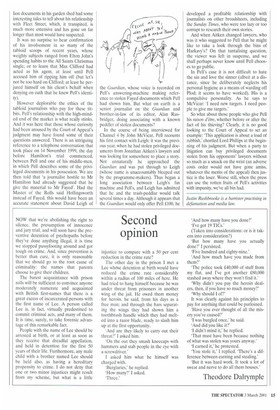WE'VE BIN ROBBED
Justin Rushbrooke accuses the Guardian of revelling in stolen rubbish
HAD he lived long enough to watch it, the late-lamented George Carman, QC, would have enjoyed Channel 4's excellent documentary Scandal in the Bins which went out in January. The broadcast was made possible by the decision of the Crown Prosecution Service last November that no criminal charges would be brought over the theft of confidential and privileged documents from dustbins outside 5 Raymond Buildings in Gray's Inn, the barristers' chambers where I practise.
The perpetrator of the theft was, of course, Benjamin Pell, binman to the rich and famous, or rather to the journalists who 'shaft' them (to use Pell's verb).
Extraordinary as they may be, Pell's exploits are not new. There is evidence going back at least as far as 1998 that this obsessive, who lives with his parents in Hendon and whose religious orthodoxy prevents him dialling his own telephone on a Saturday, spends his nights rootling through the rubbish bins of PR agents, pop managers, solicitors and — worse luck — banisters' chambers. I can think of at least four separate pieces of civil litigation involving Pell-inspired breaches of confidentiality; there may be many more. Belatedly (perhaps) and imperfectly (as is now clear) we have been keeping the shredding machine that sits outside my door busier than a fashionable libel Silk.
In November 1999 Pell pleaded guilty to the theft of rubbish bags from Harkavy's, Jonathan Aitken's solicitors, earlier that year, for which offence he was given a paltry fine on the basis of his grossly understated income. A closer look at the evidence suggests, however, that the real culprits are getting away with something worse. It is the corruption of journalism, through criminal or near-criminal acts, and it is all the worse for the professed righteousness of the culprits.
Shortly before Christmas, the Court of Appeal threw out Neil Hamilton's appeal in his libel action against Mohamed Fayed. It is not possible here to do justice to a tale that — as Lord Phillips, the Master of the Rolls, put it — resembles one of John le Carre's early novels, so here is a whistlestop tour of the facts. But before that, let us remind ourselves of the law.
Lesson number one: material is not abandoned, just because it has been left out for the dustmen. 'If I put refuse in my dustbin outside my house, I am not abandoning it in the sense that I am leaving it for anybody to take it away. I am putting it out so that it may be collected and taken away by the local authority, and until it has been taken away by the local authority it is my property. It is my property and I can take it back and prevent anyone else from taking it away.' So said the Lord Chief Jus
lice in Williams v. Phillips, the 1957 case of the Bristol dustmen who were convicted of stealing wool rags from their employers, who were held to have acquired property in the rags from the businesses which had put them out for collection.
Lesson number two. Legal professional privilege is no mere dramatic device for John Grisham novels. It is perhaps the most basic of the lawyer's articles of faith, As another Lord Chief Justice put it in the 1996 House of Lords case of R. v. Derby Magistrates Court, Ex parte B.: 'A man must be able to consult his lawyer in confidence, since otherwise he might hold back half the truth. The client must be sure that what he tells his lawyers in confidence will never be revealed without his consent. Legal professional privilege is thus .. . a fundamental condition on which the administration of justice as a whole rests .. . [it) is a fundamental human right protected by the European Convention for the Protection of Human Rights and Fundamental Freedoms..
How dearly we lawyers would love to examine the contents of our opponents' waste-paper baskets. Better still, for those of us whose sordid duty it is to act on occasion for the claimant in a libel action, it would be very heaven to be a fly on the wall in the room where the journalist defendant and his legal advisers sit in gloomy conference. How easy it would then be to plead and prove journalistic malice!
But, of course, it's just not allowed. And everybody knows it. Pd l knows it (bless him — he studied law before answering his more honourable vocation). And the journalists know it too. By a stroke of irony the Guardian had no compunction about invoking legal privilege in order to resist an application made by Hamilton's lawyers for disclosure of documents which it was said were relevant to the credibility of Fayed's cash-for-questions allegations.
Against this background, what emerged from the Court of Appeal's judgment last December is all the more surprising. In November 1999, shortly before Hamilton's trial began, Pell contacted Mark Hollingsworth, a freelance journalist in the pay of Fayed, and offered him a three-inchthick wodge of privileged documents stolen from our rubbish bags. Although the court was shown only 54 pages of documents, these were probably only a fraction of those in Pell's possession, since he had been targeting the bins from mid-1998. The documents were then delivered to Hollingsworth in five brown envelopes, and he in turn sold them for £10,000 to John McNamara, Fayed's head of security, who was acting (so the court held) on behalf of Fayed and within the scope of his authority. The truth only got out a month or so after the jury's verdict, when the Fayed camp refused to pay Pell another £10,000 and he took the story to the Mail on Sunday.
Shocked yet? Channel 4's documentary on Pell shed further light on this murky world. The man with the rubber gloves and a mil lion documents in his garden shed had some interesting tales to tell about his relationship with Fleet Street, which, it transpired, is much more extensive and has gone on far longer than most would have suspected.
It was no surprise to hear confirmation of his involvement in so many of the tabloid scoops of recent years, whose weighty subjects ranged from Elton John's spending habits to the All Saints Christmas single; or to learn that Max Clifford had acted as his agent, at least until Pell accused him of ripping him off (but let's not be too hard on Clifford; at least he perjured himself on his client's behalf when denying on oath that he knew Pell's identity).
However deplorable the ethics of the tabloid journalists who pay for these titbits, Pc 11's relationship with the high-minded end of the market is what really stinks. And it was here that those whose curiosity had been aroused by the Court of Appeal's judgment may have found some of their questions answered. There is an intriguing reference to a telephone conversation that took place on 14 November 1999, the day before Hamilton's trial commenced, between Pell and one of his middle-men, in which Pell describes some of the privileged documents in his possession. We are then told that 'a journalist hostile to Mr Hamilton had already suggested that he give the material to Mr Fayed'. Had the Master of the Rolls said Hollingsworth instead of Fayed, this would have been an accurate statement about David Leigh of
the Guardian, whose voice is recorded on Pelt's answering-machine making reference to stolen Fayed documents which Pell had shown him. But what on earth is a senior journalist on the Guardian and brother-in-law of its editor, Alan Rusbridger, doing associating with a known peddler of stolen documents?
In the course of being interviewed for Channel 4 by John McVicar, Pell recounts his first contact with Leigh: it was the previous year, when he had stolen privileged documents from Jonathan Aitken's lawyers and was looking for somewhere to place a story. Not unnaturally he approached the Guardian and was put through to Leigh (whose name is unaccountably bleeped out by the programme-makers). Thus began a long association between Leigh's fax machine and Pell's, and Leigh has admitted that he and the trash-peddlar would talk several times a day. Although it appears that the Guardian would only offer Pell £100, he developed a profitable relationship with journalists on other broadsheets, including the Sunday Times, who were too lazy or too corrupt to research their own stories.
And when Aitken changed lawyers, who was it who suggested to Pell that he might like to take a look through the bins of Harkavy's? On that tantalising question, the viewer was left in suspense, and we shall perhaps never know until Pell chooses to go public.
In Pell's case it is not difficult to hate the sin and love the sinner (albeit at a distance, since he deliberately neglects his personal hygiene as a means of warding off Plod; it seems to have worked). His is a compulsive personality. As he says to McVicar: 'I need new targets. I need people to give me targets.'
So what about those people who give Pell his raison d'être, whether before or after the fact of his thieving? Clearly, it is no good looking to the Court of Appeal to set an example: 'This application is about a load of rubbish,' chortled Lord Phillips at the beginning of his judgment. But when a party to litigation can buy privileged documents stolen from his opponents' lawyers without so much as a smack on the wrist (an adverse costs order would not have gone amiss, whatever the merits of the appeal) then justice is the loser. Worse still, when the press can use the rotten fruits of Pell's activities with impunity, we've all bin had.
Justin Rushbrooke is a barrister practising in defamation and media law.













































































 Previous page
Previous page